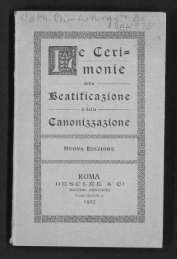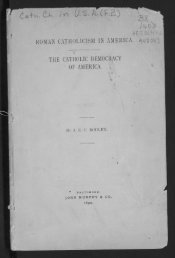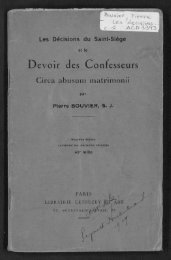Fabiola : or, The church of the catacombs - Digital Repository Services
Fabiola : or, The church of the catacombs - Digital Repository Services
Fabiola : or, The church of the catacombs - Digital Repository Services
Create successful ePaper yourself
Turn your PDF publications into a flip-book with our unique Google optimized e-Paper software.
trouble was what most he dreaded, so long as every thing waa<br />
comf<strong>or</strong>table, handsome, itnd well-served about him, he let things<br />
go on quietly, under <strong>the</strong> direction <strong>of</strong> his free.!<br />
It is not, however, so much to him that wo wish to introduce<br />
our reader, as to ano<strong>the</strong>r inmate <strong>of</strong> his house, <strong>the</strong> sharer <strong>of</strong> its<br />
splendid luxury, and <strong>the</strong> sole heiress <strong>of</strong> his wealth. This is his<br />
daughter, who, acc<strong>or</strong>ding to Roman usage, bears <strong>the</strong> fa<strong>the</strong>r's<br />
name, s<strong>of</strong>tened, however, into <strong>the</strong> diminutive <strong>Fabiola</strong>. *. As we<br />
have done bef<strong>or</strong>e, we will conduct <strong>the</strong> reader at once into her<br />
apartment. A marble staircase leads to it from <strong>the</strong> second<br />
court, over <strong>the</strong> sides <strong>of</strong> which extends a suite <strong>of</strong> rooms, opening<br />
upon a terrace, refreshed and ad<strong>or</strong>ned by a graceful fountain, and<br />
covered with a pr<strong>of</strong>usion <strong>of</strong> <strong>the</strong> rarest exotic plants. In <strong>the</strong>se<br />
chambers is concentrated whatever is most exquisite and curious,<br />
in native and f<strong>or</strong>eign art. A refined taste directing ample<br />
means, and peculiar opp<strong>or</strong>tunities, has evidently presided over<br />
<strong>the</strong> collection and arrangement <strong>of</strong> all around. At this moment,<br />
<strong>the</strong> hour <strong>of</strong> <strong>the</strong> evening repast is approaching ; and we discover<br />
<strong>the</strong> mistress <strong>of</strong> this dainty abode engaged in preparing<br />
herself, to appear with becoming splend<strong>or</strong>.<br />
She is reclining on a couch <strong>of</strong> A<strong>the</strong>nian w<strong>or</strong>kmanship, inlaid<br />
with silver, in a room <strong>of</strong> Cyzicene f<strong>or</strong>m ; that is, having glass<br />
windows to <strong>the</strong> ground, and so opening on to <strong>the</strong> flowery<br />
terrace. Against <strong>the</strong> wall opposite to her hangs a mirr<strong>or</strong> <strong>of</strong><br />
polished silver, sufficient to reflect a whole standing figure ; on<br />
a p<strong>or</strong>phyry-table beside it is a collection <strong>of</strong> <strong>the</strong> innumerable<br />
rare cosmetics and perfumes, <strong>of</strong> which <strong>the</strong> Roman ladies had<br />
become so fond, and on which <strong>the</strong>y lavished immense sums, t<br />
On ano<strong>the</strong>r, <strong>of</strong> Indian sandal-wood, was a rich display <strong>of</strong> jewels<br />
and trinkets in <strong>the</strong>ir precious caskets, from which to select f<strong>or</strong><br />
<strong>the</strong> day's use.<br />
It is by no means our intention, n<strong>or</strong> our gift, to describe<br />
persons <strong>or</strong> features ; we wish m<strong>or</strong>e to deal with minds. We<br />
will, <strong>the</strong>ref<strong>or</strong>e, content ourselves with saying, that <strong>Fabiola</strong>,<br />
now at <strong>the</strong> age <strong>of</strong> twenty, was not considered inferi<strong>or</strong> in appearance<br />
to o<strong>the</strong>r ladies <strong>of</strong> her rank, age, and f<strong>or</strong>tune, and had<br />
many aspirants f<strong>or</strong> her hand. But she was a contrast to<br />
her fa<strong>the</strong>r in temper and in character. Proud, haughty, imperious,<br />
and irritable, she ruled like an empress all that surrounded<br />
her, with one <strong>or</strong> two exceptions, and exacted humblo<br />
homage from all that approached her. An only child, whose<br />
mo<strong>the</strong>r had died in giving her birth, she had been nursed and<br />
brought up in indulgence by her careless, good-natured fa<strong>the</strong>r ;<br />
she had been provided with <strong>the</strong> best masters, had been ad<strong>or</strong>ned<br />
with every accomplishment, and allowed to gratify every ex-<br />
travagant wish. She had never known what it was to deny<br />
herself a desire.<br />
Having been left so much to herself, she had read much,<br />
and especially in pr<strong>of</strong>ounder books. She had thus become<br />
a complete philosopher <strong>of</strong> <strong>the</strong> refined, that is, <strong>the</strong> infidel and<br />
intellectual, epicureanism, which had been long fashionable hi<br />
B<strong>or</strong>ne. Of Christianity she knew nothing, except that she<br />
understood it to be something very low, material, and vulgar.<br />
She despised it, in fact, too much to think <strong>of</strong> inquiring into it.<br />
And as to paganism, with its gods, its vices, its fables, and its<br />
idolatry, she merely sc<strong>or</strong>ned it, though outwardly she followed<br />
it. In fact, she believed in nothing beyond <strong>the</strong> present life,<br />
and thought <strong>of</strong> nothing except its refined enjoyment. But her<br />
very pride threw a shield over her virtue ; she loa<strong>the</strong>d <strong>the</strong><br />
I ness <strong>of</strong> hea<strong>the</strong>n society, as she despised <strong>the</strong> frivolous<br />
youths who paid her jealously exacted attention, f<strong>or</strong> she found<br />
amusement hi <strong>the</strong>ir follies. She was considered cold and<br />
selfish, but ehe was m<strong>or</strong>ally irreproachable.<br />
If at <strong>the</strong> beginning we seem to indulge in long descriptions,<br />
wo trust that our reader will believe that <strong>the</strong>y are requisite,<br />
to put him hi possession <strong>of</strong> <strong>the</strong> state <strong>of</strong> material and social<br />
ut <strong>the</strong> period <strong>of</strong> our narrative ; and will make this <strong>the</strong><br />
m<strong>or</strong>e intelligible.<br />
* 1 >F<br />
Till-: CHURCH OF Till' CA TM'OMIiS. 5<br />
And should he be tempted to think that we<br />
lie things as over splendid and refined f<strong>or</strong> an age <strong>of</strong><br />
e in arts and good tni;N-, we beg to remind him, that <strong>the</strong><br />
ir- j.<br />
t Th milk <strong>of</strong> GOO assoe per day was required to furnish Popprea, Nero* wif><br />
with o;<br />
year vre are supposed to visit Rome is not as remote from<br />
<strong>the</strong> better periods <strong>of</strong> Roman art, f<strong>or</strong> example, that <strong>of</strong> <strong>the</strong><br />
Antonines, as our age is from that <strong>of</strong> Cellini, Rnffaole, <strong>or</strong><br />
Doimtello. Yet in how many Italian palaces are still preserved<br />
w<strong>or</strong>ks by <strong>the</strong>se great artists, fully prized, though no<br />
longer imitated? Ho, 110 doubt,<br />
it was with <strong>the</strong> houses-<br />
belonging to <strong>the</strong> old and wealthy families <strong>of</strong> Rome.<br />
We find, <strong>the</strong>n, <strong>Fabiola</strong> reclining on her couch, holding<br />
in her left hand a silver mirr<strong>or</strong> with a handle, and in <strong>the</strong> o<strong>the</strong>r a<br />
strange instrument f<strong>or</strong> BO fair a hand. It is a sharp-pointed<br />
stiletto, with a delicately carved iv<strong>or</strong>y handle, and a gold ring, to<br />
hold it by. This was <strong>the</strong> fav<strong>or</strong>ite weapon with which Roman<br />
ladies punished <strong>the</strong>ir slaves, <strong>or</strong> vented <strong>the</strong>ir passion on <strong>the</strong>m,<br />
upon suffering <strong>the</strong> least annoyance, <strong>or</strong> when irritated by pettish<br />
anger. Three female slaves are now engaged about <strong>the</strong>ir mistress.<br />
<strong>The</strong>y belong to different races, and have been purchased at high<br />
prices, not merely on account <strong>of</strong> <strong>the</strong>ir appearance, but f<strong>or</strong> some<br />
rare accomplishment <strong>the</strong>y are supposed to possess. One is a<br />
black ; not <strong>of</strong> <strong>the</strong> degraded negro stock, but from one <strong>of</strong> those<br />
races, such as <strong>the</strong> Abyssinians and Numidians, in whom <strong>the</strong><br />
features are as regular as in <strong>the</strong> Asiatic people. She is supposed<br />
to have great skill in herbs, and <strong>the</strong>ir cosmetic and healing<br />
properties, perhaps also in m<strong>or</strong>e dangerous uses in compounding<br />
philtres, charms, and possibly poisons. She is merely<br />
known by her national designation as Afra. A Greek comes<br />
next, selected f<strong>or</strong> her taste in dress, and f<strong>or</strong> <strong>the</strong> elegance and<br />
purity <strong>of</strong> her accent ; she is <strong>the</strong>ref<strong>or</strong>e called Graia. <strong>The</strong> name<br />
which <strong>the</strong> third bears, Syra, tells us that she comes from Asia :<br />
and she is distinguished f<strong>or</strong> her exquisite embroidery, and f<strong>or</strong><br />
her assiduous diligence. She is quiet, silent, but completely<br />
engaged with <strong>the</strong> duties which now devolve upon her. <strong>The</strong><br />
o<strong>the</strong>r two are garrulous, light, and make great pretence about<br />
any little thing <strong>the</strong>y do. Every moment <strong>the</strong>y address <strong>the</strong> most<br />
extravagant flattery to <strong>the</strong>ir young mistress, <strong>or</strong> try to promote<br />
<strong>the</strong> suit <strong>of</strong> one <strong>or</strong> o<strong>the</strong>r <strong>of</strong> <strong>the</strong> pr<strong>of</strong>ligate candidates f<strong>or</strong> her<br />
hand, who has best <strong>or</strong> last bribed <strong>the</strong>m.<br />
" How delighted I should be, most noble mistress," said <strong>the</strong><br />
black slave, "if I could only be in <strong>the</strong> triclinium* this evening<br />
as you enter in, to observe <strong>the</strong> brilliant effect <strong>of</strong> this new<br />
stibiumf on !<br />
your guests It has cost me many trials bef<strong>or</strong>e I<br />
could obtain it so : perfect I am sure nothing like it has been<br />
ever seen in Rome."<br />
"As f<strong>or</strong> nie," interrupted <strong>the</strong> wily<br />
presume<br />
Greek, "I should not<br />
to aspire to so high an hon<strong>or</strong>. I should be satisfied to<br />
look from outside <strong>the</strong> do<strong>or</strong>, and see <strong>the</strong> magnificent effect <strong>of</strong><br />
this wonderful silk tunic, which came with <strong>the</strong> last remittance<br />
<strong>of</strong> gold from Asia. Nothing can equal its beauty ; n<strong>or</strong>, I may<br />
add, is its arrangement, <strong>the</strong> result <strong>of</strong> my study, unw<strong>or</strong>thy <strong>of</strong><br />
<strong>the</strong> materials."<br />
"And you, Syra," interposed <strong>the</strong> mistress, with a con-<br />
temptuous smile, "what would you desire ? and what have you<br />
to praise <strong>of</strong> your own doing ?"<br />
" Nothing to desire, noble lady, but that you may be ever<br />
happy ; nothing to praise <strong>of</strong> my own doing, f<strong>or</strong> I am not conscious<br />
<strong>of</strong> having done m<strong>or</strong>e than my duty," was <strong>the</strong> modest and<br />
sincere reply.*<br />
It did not please <strong>the</strong> haughty lady, who said, "Methinks,<br />
slave, that you are not over given to praise. One seldom hears<br />
a s<strong>of</strong>t w<strong>or</strong>d from your mouth. "<br />
" And what w<strong>or</strong>th would it be from me," answered Syra;<br />
"from a po<strong>or</strong> servant to a noble dame, accustomed to hear it<br />
all day long from elegant and polished lips ? Do you believe<br />
it when you hear it from <strong>the</strong>m f Do you not despise it when<br />
receive it from us t"<br />
you<br />
A look <strong>of</strong> spite was darted at her from her two companions.<br />
<strong>Fabiola</strong> too was angry a; what she thought a repro<strong>of</strong>. A l<strong>of</strong>ty<br />
sentiment in a slave ;<br />
"Have you yet to learn <strong>the</strong>n," she answered haughtily,<br />
"that you are mine, and have been bought by me at a high<br />
price, that you might serve me as 7 please ? I have as good s<br />
right to <strong>the</strong> service <strong>of</strong> your tongue as <strong>of</strong> your arms ; end if it<br />
please me to be praised, and flattered, and sung to, by you, do<br />
<strong>The</strong> (lining-hall. t Black antimony atwlied on <strong>the</strong> ejolidB,

















